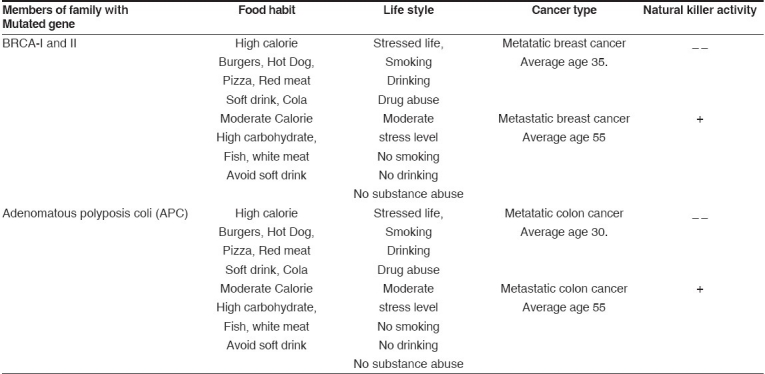The incidence of spontaneous cancers and immunosurveillant or host defense mechanisms are under the direct control of multiple gene products. Number of genes are identified those are directly associated with cancer. Natural killer T (NKT) cells and natural killer (NK) cells the two most important components of innate immunity directly involved in immunosurveillance for cancer. Certain genes are identified as mutated within a family and members of such family are considered to be at risk of getting the particular cancer in their lifetime. Expression of the mutated genes and thus their products are capable of changing the activities of innate immune system followed by inappropriate adoptive immune response. Adequate nutrition along with good life style could stop the expression of those bad genes and eventually offer a cancer free life.
It has been well documented that immunity against cancer exists[1–4] but there is no such antigen that has been identified as exclusively tumor specific. Number of tumor associated antigens (TAA) are being identified, those are largely self-antigens and, therefore, TAA-specific immune responses, whether cellular or humoral, are weak and difficult to measure. As such standard tests for measuring immune competence to tumor-associated antigens (TAA), similar to those available for the assessment of responses to foreign antigens such as bacterial, viral or fungal antigens, have not been available. According to the immune surveillance theory NKT cells and NK cells are responsible for early recognition and elimination of malignant cells.[5,6] The NK activity might not be effective enough in patients who develop malignancy. There are convincing evidences that individuals who are older, who have been on immuno-suppressive medications over prolonged period of time or have underlying immune abnormalities, such as a chronic infection are particularly at high risk of cancer.[3,4] Apart from genetic predisposition to cancer[5] most common risk factors for cancer are age, poor nutrition, stress, smoking and excessive drinking.[6,7] Poor nutrition, stress, smoking, drinking are also associated with more or less pronounced abnormalities in the immune system.
Although testing for immune competence in populations at high risk for malignancy has not been routinely performed, a low NK activity has been reported in familial breast cancer patients as well as their clinically asymptomatic first degree relatives.[6] Other studies have shown that members of cancer families have lower levels of natural cytotoxic activity than age-matched individuals without cancer in first degree relatives.[6,7] These studies suggest that among the unaffected family members, persons with lower NK cell activity may be at higher risk of cancer.[8] Further detailed studies with unaffected family members of the high risk group revealed that the members who maintain a reasonably good life style, do have NK activity equivalent to those members of no risk group with good life style (unpublished data). All these studies implicate significantly lower levels of NK cell activity for patients with advanced malignant disease and a persistently low NK cell activity as a risk for developing malignancy. Also, inappropriate innate or NK activity leads to inadequate adoptive immune responses by T cells (helper or cytotoxic) in individuals who later developed a malignancy.[9] Although these reports have not been uniformly accepted as evidence for a lack of immune surveillance in individuals at high risk of cancer, number of evidence suggest that good life style could prevent or delay the expression of cancer associated familial genes. Table 1 gives the evidence that how cancer associated gene expression could affect NK activity and occurrence of cancer.
Table 1.
Mutated genes and occurrence of malignant diseases

All the available reports together indicate that the host immune competence in respect to innate as well as adaptive immunity is important and perhaps necessary for cancer prevention.
Table 1 is an example of food habit and life style and subsequent loss of natural killer cell activity in members of the families having mutated genes, breast cancer associated gene I and II (BRCA-I andII) and adenomatous polyposis coli which is associated colorectal carcinoma.
It appears that good life style is an important factor so as the appropriate nutrition. In the advanced countries and in the developing countries, where good nutrition is not a big factor, only a good life style would help to prevent or significantly delay the onset of the expression of the bad gene. In poor or under developed countries both nutrition as well as good life style should be under consideration. Another very important point is that the first degree relatives without being too much worried about getting the disease should take appropriate measure regarding the life style and nutrition and routine medical check-ups.
Footnotes
Source of Support: Nil
Conflict of Interest: None declared.
References
- 1.Whiteside T. Immune suppression in cancer: Effects on immune cells, mechanisms and future therapeutic intervention. Semin Cancer Biol. 2006;16:3–15. doi: 10.1016/j.semcancer.2005.07.008. [DOI] [PubMed] [Google Scholar]
- 2.Burnet F. Cancer: A biologic approach. Br Med J. 1957;1:841–7. doi: 10.1136/bmj.1.5023.841. [DOI] [PMC free article] [PubMed] [Google Scholar]
- 3.Fearon ER. Human cancer syndromes: Clues to the origin and nature of cancer. Science. 1997;278:1043–50. doi: 10.1126/science.278.5340.1043. [DOI] [PubMed] [Google Scholar]
- 4.Perera FP. Environment and cancer: Who are susceptible? Science. 1997;278:1068–73. doi: 10.1126/science.278.5340.1068. [DOI] [PubMed] [Google Scholar]
- 5.Pawelec G, Quyang Q, Colonna-Romano G, Candore G, Lio D, Caruso C. Is human immunosenescence clinically relevant? Looking for immunological risk phenotypes. Trends Immunol. 2002;23:330–2. doi: 10.1016/s1471-4906(02)02255-x. [DOI] [PubMed] [Google Scholar]
- 6.Strayer DR, Carter WA, Brodsky I. Familial occurrence of breast cancer is associated with reduced natural killer cytotoxicity. Breast Cancer Res Treat. 1986;7:187–92. doi: 10.1007/BF01806249. [DOI] [PubMed] [Google Scholar]
- 7.Bovbjerg DH, Valdimarsdottir H. Familial cancer, emotional distress and low natural cytotoxic activity in healthy women. Ann Oncol. 1993;4:745–52. doi: 10.1093/oxfordjournals.annonc.a058659. [DOI] [PubMed] [Google Scholar]
- 8.Shevde LA, Joshi NN, Shinde SR, Nadkarni JJ. Studies on functional status of circulating lymphocytes in unaffected members from cancer families. Hum Immunol. 1998;59:373–81. doi: 10.1016/s0198-8859(98)00027-5. [DOI] [PubMed] [Google Scholar]
- 9.Reuben JM, Hersh EM. Delayed hypersensitivity responses of cancer patients to recall antigens using a new “multi test” applicator. Ann Allergy. 1984;53:390–4. [PubMed] [Google Scholar]


